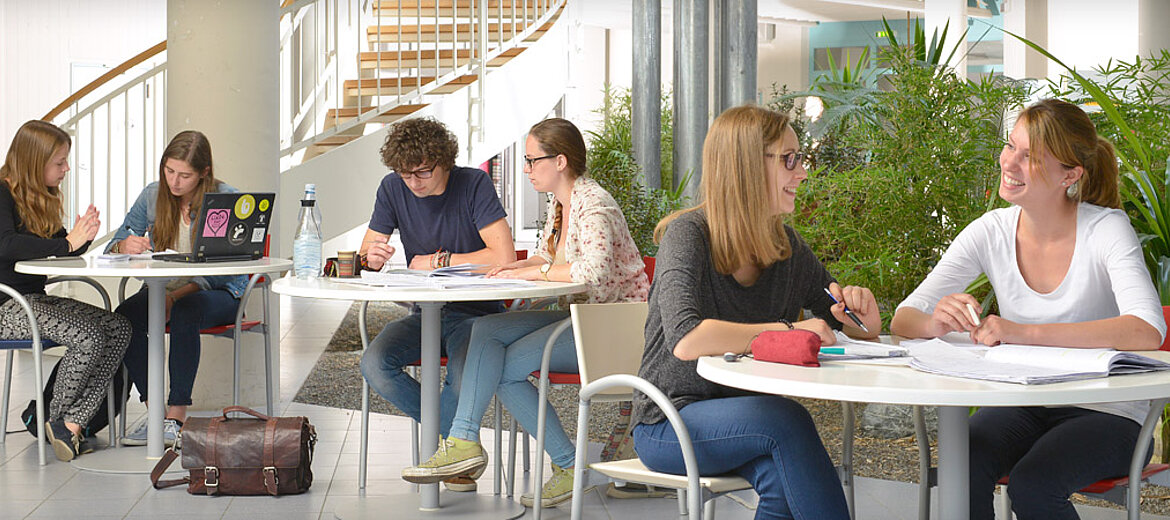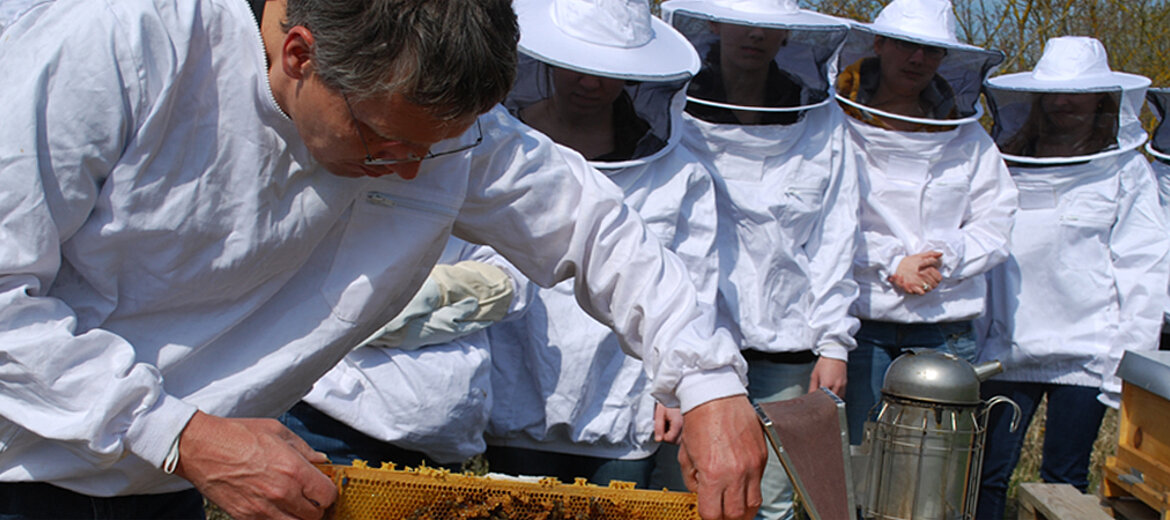Ecology
Further topics include aspects of Organismic and Molecular Biology, the interactions of plants and animals with abiotic and biotic environmental factors, the interaction of individuals, populations and communities in complex and variable ecosystems and constraints for plant growth and development (biogeography, biodiversity).
Programme Profile: Ecology
The multidisciplinary programme combines plant ecology, animal ecology, conservation biology and tropical biology. These topics include animal-plant interactions, plant ecophysiology, biodiversity research, climate-change ecology, and the evolutionary adaptations at the physiological and organismic level. Courses in socio-biology, neurogenetics and behaviour as well as ecological courses like forest ecology, chemical ecology, agroecology, soil ecology, remote sensing and ecological modelling can be chosen. Overall, the study program reaches from molecular biology of single species to all disciplines of organismic biology. Further topics include constraints for plant growth and development (biogeography, biodiversity), the interactions of plants and animals with abiotic and biotic environmental factors (e.g. plant-insect, plant-fungus interactions) including the evolutionary adaptations at the physiological and organismic level, aspects of neurogenetics and behaviour as well as the interaction of individuals, social groups and large populations in complex and variable ecosystems. Using tropical biology with its specialties, unique and general principles in ecology are communicated. Both fundamentals and novel approaches based on molecular biology tools are discussed with respect to organismic biology. The two selected topics are composed of two theory modules as well as a practical course unit each. Further research training is provided in a selected field of interest, and the students are actively involved in ongoing research projects and learn to independently plan and perform both theoretical and experimental work and finally, to summarize and discuss the results obtained in the thesis.
Programme Schedule
- S1 TOPIC 1 (2 theory modules plus practical course)
- S2 TOPIC 2 (2 theory modules plus practical course)
- S3 Advanced experimental training (F2, 15CP) + additional special courses (15 CP)
- S4 Thesis + final colloquium
Curriculum
For detailed informations on the following modules listed are available in the Online Course Book, Master Biosciences, Module Group 4 WueStudy
Year 1 (Winter-Semester)
- Neurobiology, Behavioural Physiology and Animal Ecology
- Conservation Biology (or Molecular Biology in SS)
- Animal Ecology and Tropical Biology (or Animal Ecology and Tropical Biology 2 in SS)
- Animal Ecology and Tropical Biology F1 (Practical Course)
- Additional Courses
Year 1 (Summer-Semester)
- Molecular Biology (or Conservation Biology in WS)
- Plant Ecology
- Molecular and Chemical Plant Ecology F1 or Physiological Plant Ecology F1 (Practical Course)
- Animal Ecology and Tropical Biology 2 (or Animal Ecology and Tropical Biology in WS)
- Additional Courses
Year 2
- Physiological Plant Ecology F2 or Molecular and Chemical Plant Ecology F2 or Animal Ecology and Tropical Biology F2
- Additional Courses
Modules - Theory
Animal Ecology and Tropical Biology
In the lecture an overview is given of theoretical basics and current issues in animal ecology. Thematic focal points are biodiversity and ecosystem functions, multitrophic interactions and food webs, evolutionary ecology, chemical ecology, tropical ecology, agroecology and global change. In the seminar current scientific publications on the above topics will be presented and discussed.
Animal Ecology and Tropical Biology 2
The lecture provides insights into basic principles in ecology with particular focus on the biology of tropical habitats including tropical biocenosis. Special attention is given to the global importance of tropical systems (“ecosystem goods” and “ecosystem services”) as well as to biological specialties and aspects of particular adaption in these highly diverse biomes. In the seminar the students learn to perform problem based scientific literature research, to present recent publications and to critically discuss these new findings.
Conservation Biology
The lecture focusses on the essentials in conservation biology and the causes of global change for organisms and ecosystems. Nature conservation relevant topics from theory to application will be the main focus.
Plant Ecology
The lecture will deal with the ecological and environmental constraints under which plants grow and develop (biogeography, biodiversity) and with the interactions of plants with abiotic and biotic environmental factors (e.g. plant-insect, plant-fungus interactions). Especially, the evolutionary adaptations on the physiological and organismic level will be emphasized (stress and defense reactions, carnivory, plant protection). Corresponding experimental approaches are illustrated. The seminar deepens the topics covered by the lecture based on selected examples from current research and is complemented by topic-related guided tours in the Botanical Garden of the University of Würzburg.
Molecular Biology (Lecture Series)
The lecture series is a joint activity of the chairs of Cell- and Developmental Biology, Microbiology, Biophysics and Bioinformatics and deals with concepts of modern molecular biology from the point of view of these different disciplines.
The section Cell Biology (app. a quarter of the lecture) mainly regards the eukaryotic cell and intends to elucidate the vast diversity in structure and function of molecules, organelles and cells in addition to basic principles of modern molecular cell biology.
The bioinformatics section (app. a quarter of the lecture) contains a large amount of examples for applications which allow the investigation of the molecular biology of a cell with bioinformatics tools. We closely adhere to the contents of the book „Essential Cell Biology“ and present many clear and useful examples for the application of our tools working on the topics of the other three chairs. Our vision: bioinformatics essentially is molecular biology based on computing technology (time consuming „wet“ experiments can be planned more easily and thus bioinformatics saves precious time).
The microbiological section (app. a quarter of the lecture) deals with basic molecular aspects of prokaryotic cells. Key aspects include the organization of the bacterial genome, the transcription and translation machinery, mechanisms of regulation of gene expression, transport of small molecules and macromolecules, cell division and differentiation, bacterial motility and chemotaxis, signal transduction and bacterial communication mechanisms.
Neurobiology, Behavioural Physiology and Animal Ecology - Insects in a changing environment (Lecture series)
Changing environments impact all organisms on earth. The environment affects neurobiology, behaviour, and navigation. Animals make use of endogenous clocks to predict and adapt to daily or seasonal changes of the environment. Environmental changes, which are often man-made, like climate change, affect the individual behaviour, biotic interactions, the distribution of species, species communities, and chemical and evolutionary adaptations.
The lecture series gives a introduction to the effects of changing environments on different aspects in biology and the underlying neuronal, physiological, behavioural, and ecological mechanisms. Animal adaptations which have evolved to cope with these changes as well as extinction risks of species will be discussed.
Modules – Practical Courses
Animal Ecology and Tropical Biology F1
This module consists of several practical courses (minimum three courses lasting together five or six weeks (minimum CoH = 13) and a seminar series in the summer semester. The practical courses can be chosen from the following electives:
- Agroecology
- Biodiversity, Ecosystem Services and Conservation
- Chemical Ecology
- Ecological Modelling
- Forest Ecology
- Global Change Ecology
- Honey and Wild Bee Ecology
- Macroecology
- Remote Sensing in Ecology
- Soil Ecology
- Tropical Ecology
In the seminar, topics of the exercised modules will be presented and discussed.
Animal Ecology and Tropical Biology F2
In F2 internship, student work on one scientific question as independent as possible. It includes the development of hypothesis, preparation of a work plan, and implementation of data collection, experiment in the field, green house or laboratory, and statistical analysis of the data. The results are presented in a protocol, which resembles the form and content of a short scientific paper with introduction, material and method, results, and discussions. A regular attendance in the department seminar is expected. In the various working groups of the department of Animal Ecology and Tropical Biology, there are many possibilities to conduct an F2 internship in Germany, Europe or in the tropics. They can be carried out in an ongoing research project of the institute or in cooperation with other institutions. Information about the F2 internships as well as current topics might be found on the webpage of the department or the black board of the department or can be requested directly from the working groups.
Physiological Plant Ecology F1
Under the guidance of an experienced scientist, the student work on a current research topic from the field of ecology/ecophysiology. Special topics are the physiological bases of the interactions between plants and abiotic and biotic environmental factors (e.g. water relations, stress, biogeography). Working concepts and complex experiments are designed, and the results will be documented and presented as presentations, publications or protocols. The participants are involved in ongoing projects and deepen their knowledge on applying special methods, especially in ecophysiology, but also in chemical analysis.
Physiological Plant Ecology F2
Students work on projects taken from ongoing research in the supervisors’ labs either from the field of ecology or of the ecophysiology of plants (e.g. plant-insect-, plant-fungus interactions; biogeography; water relations). They do this work to a large extent on their own responsibility by performing advanced experiments, their documentation and evaluation. Based on the results obtained, the ecophysiological and analytical methods applied (e.g. measurement of transpiration, fluorescence microscopy, chlorophyll-fluorometry) are critically assessed, and, where necessary, modified. The progress of the experiments and their contribution to more general projects are documented and presented as presentations, publications or protocols.
Molecular and Chemical Plant Ecology F1
Under the guidance of an experienced scientist, the students work on individual current research topics in the field of ecology/ecophysiology. Special topics are the molecular and chemical bases of the interactions between plants and abiotic and biotic environmental factors (e.g. cuticular barrier properties, plant-insect, and plant-fungus interactions). Working concepts and complex experiments are designed, and the results are documented and presented as presentations, publications or protocols. The participants are involved in ongoing projects and deepen their knowledge on applying special methods, especially in ecophysiology, but also in chemical analysis.
Molecular and Chemical Plant Ecology F2
Students work on projects taken from ongoing research in the supervisors’ labs either from the field of molecular and chemical plant ecology (e.g. cuticular barrier properties, plant-insect, and plant-fungus interactions). They do this work to a large extent on their own responsibility by performing advanced experiments, their documentation and evaluation. Based on the results obtained, the analytical, molecular biological and/or microbiological methods applied (e.g. PCR, cloning strategies, chromatography, mass spectrometry) are critically assessed, and, where necessary, modified. The progress of the experiments and their contribution to more general projects are documented and presented as presentations, publications or protocols.
Subtopic Additional Achievements
Agroecology
In this practical course, students get to know typical animal communities in agricultural systems, from ground-dwelling and flying invertebrates to mammals and birds and learn about their function in the ecosystem. We will experimentally assess, how these communities are affected by agricultural management, and which role agri-environmental measures play in protecting animals and the ecosystem services they provide (e.g. pollination, pest control, decomposition). Includes field trips to different farms within the Lower Franconian region.
Biodiversity, Ecosystem Services and Conservation
This practical course will be held as a block-course in which students will use publicly available (spatial) data to develop and evaluate scenarios of landscape development or management. A selection of methods relevant for planning in conservation contexts such as monitoring tools, landscape mapping, natural capital valuation and others will be introduced. The students will apply the appropriate tools in the context of a case study, analyse the resulting data and present discuss the results among their peers.
Chemical Ecology
The students will be introduced in this practical course into the chemical interaction of organisms with their biotic and abiotic environment with a focus on evolutionary and ecological research questions. You will learn adequate biological methods to study these interactions as well as analytical methods to characterize the substances used by the organisms. The aim of the course is to lead you to up-to-date topics in the field of chemical ecology.
Ecology of Honey Bees and Wild Bees
This practical course introduces students to the life of honey bees and wild bees; principles and techniques of beekeeping (colony management, breeding, diseases); resource use of honey bees and wild bees (bee dances, flower visiting, pollen analysis, foraging behavior, nesting aid); Taxonomy of wild bees, opponent of bees, wild bees in different habitats (excursion), honey bee excursion, e.g. visiting of the bee center in Veitshöchheim.
Forest Ecology
Winter semester: This practical course will be held as a block-course at the Jungendwaldheim, Wessely Haus, Bavarian Forest National Park. Contents include the determination and detection of mammals and birds in mixed mountainous forests. Also, we will conduct experimetall fieldwork an related data analysis methods.
Summer semester: This practical course will be held as a block-course at the Field Station Fabrikschleichach. Contents include the determination and detection of Arthropods in forests dominated by beeches in the Steigerwald. Focus are conservation relevant species and species relevant for phytosanitary control measures. Also, we will conduct experimental field- and laboratory work.
Global Change Ecology
This proctical course provides students with an overview of the impacts of global change on biological systems. Using literature, media and data analyses as well as field trips and modelling, the significance of various anthropogenic influences (e.g. climate and land use change, pollution, invasive species) on species and ecosystems is examined. In interactive and interdisciplinary formats (e.g. expert discussions, role plays), the students will deepen what has been learned and options for action will be developed and discussed.
Macroecology
This practical course provides students with an introduction to macroecology (which deals with patterns and processes of biological diversity at large spatial and temporal scales) and, in particular, practical knowledge and skills of macroecological research. Using prepared (bio)geographic and ecological data, students will analyse large-scale biodiversity patterns, the influence of abiotic factors on species distributions and species richness, and potential conservation applications. In individual projects students will apply the learned methodological approaches.
Modelling in Ecology
On the basis of exemplary tasks in Ecology, the students will learn in this practical course about different simulation techniques and modelling methods. In the same time, they will also develop their own simulation program to address demographical or evolutionary questions.
Remote Sensing in Ecology
Winter semester: In this practical course students will learn the basics of remote sensing and their application in ecology and conservation.
Summer semester: In this practical course students will learn how drone flights are used for remote sensing in ecology and conservation.
Soil Ecology
This practical course is a one-week block course. First, students get an introduction to soil biodiversity and soil ecology under global change. Afterwards, they learn how to assess and sample soil fauna communities (mesofauna, macrofauna, earthworms) in local habitats. Animals are sampled with adequate sampling techniques, extracted, and afterwards identified to the highest resolution possible. Finally, different habitats are compared based on their soil-fauna communities and the results will be contextualized among the existing literature.
Tropical Ecology
This practical course usually takes place in East Africa and contains excursions to African ecosystems like coral reefs and savanna national parks. It is only offered every second year and students have to cover essential part of costs themselves. Inthe tropical ecosystem, small projects with ecological or nature conservation related issues will be performed. Here the students should learn about the steps of experiment design, implementation, data analysis, up to data presentation. In the evening seminar, recent publications are presented in the field of Tropical Ecology and will be discussed.
Ecology and Taxonomy of Insects (in German only)
This practical course is due to several constrains in German. Identification and classification of the characteristics of different groups of arthropods, especially insects. Knowledge of special form is provided. Observation and recording of arthropods in habitats. Experimental laboratory and field work on ecological or behavior biological characteristics of the respective groups of arthropods. In addition, also compilation of species richness and niche differentiation. The aim is to link the phylogenetic and morphological characteristics of arthropods with their ecological functions.
Programing using Python
Introduction into the programming language Python.
Experimental Sociobiology B
The lectures highlight the diversity and the evolution of social behavior, but also focus on the physiological, neurobiological and behavioural mechanisms underlying the organization of social groups. In a follow-up seminar session students will deepen their knowledge by presenting and discussing actual papers related to the topic of the lecture.
Neurogenetics and Behaviour B
This theory module focusses on the understanding how the brain controls behavior is at the heart of neuroscience. Both the brain and behavior can be overwhelmingly complex and plastic, but neurogenetic methods are powerful tools for unraveling the principles of how the brain controls behavior. This lecture will provide an overview of current and important topics in behavioral neuroscience (e.g., sleep, appetite and feeding control, social behavior, mating, mirror neurons, molecular mechanisms of auditory behavior, neurogenetic techniques), with an emphasis on the genetic model system Drosophila melanogaster, but the content will also be illustrated with examples from other animal groups of insects and mammals.
Endogenous clocks B
This theory module gives an introduction into endogenous clocks of unicellular organisms, fungi, plants and animals, with focus on the neuronal organisation of the clock in the brain of mammals and insects. The biological functions of endogenous clocks and the underlying mechanisms will be discussed on the molecular, cellular and organismic level. How clocks adjust to a 24h day with variable photoperiods will be explained. Applied aspects regarding e.g. shift work or jetlag will also be included.
Presentation of Scientific Data
The students write a scientific mini review including correct citation and learn various options to present scientific data including manuscript writing followed by an oral presentation (15 min).The manuscript is based on original papers as well as on reviews and follows the instructions of a scientific journal of choice, which may be found at the home page under e.g. “Instructions to Authors”. Both length of chapters and structure of the article should be based on the style of the selected journal.Attendance at 20 or more scientific talks (e.g. defense of doctoral thesis, presentation of research projects, retreats ) including presentation by guest speakers.
Quality Assurance, Good Practice, Biosafety and Biosecurity
Good Practice in the Biosciences, quality assurance approaches and quality culture. Structure, idea and basic principles of quality management approaches, DIN EN ISO 9001, regulatory documents and framework in the biosciences including biotechnology, biosafety, biosecurity, risk assessment.
Additional Courses & Final Thesis
FINAL THESIS
Thesis
C: A defined scientific question is addressed by adequate techniques. Students plan and perform experiments to solve problems or summarize and interpret existing data. The students have to develop a research plan and apply advanced and novel techniques in the context of a given research project according to good scientific practice. The results are summarized in a written thesis. The project lasts for six month.
LO: Students are qualified to scientifically work on a topic on their own. They are competent to discuss the current research in the field. They are competent to work according to good practice and to document, interpret and to discuss their results. They are competent to discuss and to defend their data in the scientific community.
Thesis Defense / Oral examination Biology
C: Verification of thesis content through oral examination. Total length should not exceed 45 min. (30 min. plus 15 min. of questions pertaining to the thesis, as well as related subjects)
LO: The students are able to present the results of their thesis work to a public audience in a limited time and they are able to critically discuss questions and concerns.










